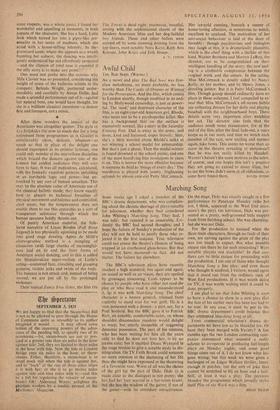Awful Child
'TM BAD SEED. (Warner.) As a novel and play The Bad Seed was first- class melodrama, no more probable, no less worthy than The Castle of Otranto or Witness for the Prosecution. And the film, which comes to London shortly, though modified in its end- ing by Hollywood censorship, is just as power- ful. The 'seed,' and dominant character of the film, is an eight-year-old American girl, Rhoda, who turns out to be a psychopathic killer. She has a background that on the . surface is excessively normal, like a story in the Saturday Evening Post. Dad is away in the army, and mom, kind and harassed, copes bravely, Sure, she's a little worried about RhOda's sulks at not Winning a school medal for penmanship. But that's just a phase, Then the Medal-winner is found drowned at the school picnic, and one of the Most horrifying film revelations in years is on. This is horror the more effective because it restrains its field to 'things of every day.' The murderess is played with jaunty, frightening aplomb by eleven-year-old Patty McCormack. Her ice-cold cunning, beneath a veneer of home-loving affection, is monstrous to watch, excellent to applaud. The motivation of her anti-social - behaviour is laid at the door of heredity: though psychiatrists and biologists may laugh at this, it is dramatically plausible, which is the chief thing with a thriller of this kind. Warner Brothers and Mervyn LeRoy, the director, arc to be congratulated on their intelligent handling of the story; the new-end- ing is a creditable compromise between the original work and the . censor. In the acting. Miss McCormack is stoutly aided by Nancy Kelly, as her mother, and by Henry Jones, a drooling janitor. But it is Patty McCormack's film. Though gossip should ordinarily have no place in these columns, I feel compelled to re- veal that Miss McCormack's. off-screen habits are collecting dresses for her dolls and playing baseball with the neighbourhood boys. These details seem very important after watching her act. The director also feels that the audience needs some reassurance, for at the end of the film, after the final fade-.out, a voice keeps us in our seats, and then we watch each member of the cast, now smiling and normal again, take bows. This seems no worse than an actor in the theatre revealing at • curtain-call that he was not really killed by Macduti. Warner's haven't the same motives as the actor, of course, and one hopes this isn't a practice they are going to .extend to many films, but to me the bows didn't seem at all ridiculous, as
some have found them. DAVID STONE


































 Previous page
Previous page